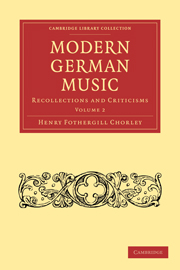Book contents
- Frontmatter
- Contents
- WEIMAR AND LEIPSIC
- DR. SPOHR'S MUSIC
- A GLANCE AT VIENNA
- CHAP. I Traditions of Vienna
- CHAP. II Down the Danube
- CHAP. III Autumn Musicand Dancing
- CHAP. IV The Leopoldstadt Theatre and Mozart
- CHAP. V Austrian Influences on Art
- CHAP. VI Schubert and his Music
- MUSIC IN THE RHINE LAND
- THE LAST DAYS OF MENDELSSOHN
CHAP. III - Autumn Musicand Dancing
Published online by Cambridge University Press: 07 September 2010
- Frontmatter
- Contents
- WEIMAR AND LEIPSIC
- DR. SPOHR'S MUSIC
- A GLANCE AT VIENNA
- CHAP. I Traditions of Vienna
- CHAP. II Down the Danube
- CHAP. III Autumn Musicand Dancing
- CHAP. IV The Leopoldstadt Theatre and Mozart
- CHAP. V Austrian Influences on Art
- CHAP. VI Schubert and his Music
- MUSIC IN THE RHINE LAND
- THE LAST DAYS OF MENDELSSOHN
Summary
The serious music which I heard at Vienna, though all belonging to a past period–and none marking progress or creative activity in the capital–was neither poor nor unimportant. To begin with opera–at the Kärnther Thor Theatre, during my visit, the following works were performed: – “ Jessonda,” “ Fidelio,” “ Don Juan” “Guillaume Tell,” “Les Huguenots” –and performed, too, by a company of artists more than ordinarily efficient and accomplished, for Germany.
Madame Van Hasselt Barth, and Madame Stöckl Heinefetter, were the prime donne. The former lady had a vocal purity–if not very extraordinary range of vocal execution,–united with German musical enthusiasm, which I have rarely met in other ladies of her country. Her voice was clear, elastic, and perfectly in tune. If not a very interesting, she was a most classical Donna Anna–an effective Valentine, too, in Meyerbeer's opera; and she has left on my mind the impression of a truly satisfactory singer. When on the stage with her as Donna Elvira, Madame Stöckl Heinefetter curbed the untutored force of her stupendous soprano voice, and thus seemed, by many degrees, more like an artist than she did when, in “Fidelio,”she sang the first part–and raged through Beethoven's passionate music, like a sesquialtera stop in an organ, doing its very loudest. The name of the Zerlina in “Don Juan,” and of the Marcellina in “Fidelio,” I have forgotten, from which it is fair to fancy that the lady must have been innocuous, if not very arch and winning.
- Type
- Chapter
- Information
- Modern German MusicRecollections and Criticisms, pp. 132 - 155Publisher: Cambridge University PressPrint publication year: 2009First published in: 1854



